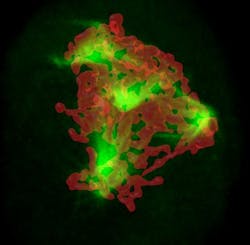Biophotonic methods help discover way to boost chemotherapy for cancer
Cancer cells often develop defense mechanisms that enable them to survive chemotherapy. Recognizing this, a group of researchers from the Institutes of Pharmacology and Pathology at the University of Bern in Switzerland present new solutions for preventing the development of such resistances. Biophotonic techniquesâfluorescence microscopy and flow cytometryâhelped them with their findings.
Related: Super-res microscopy yields clearest images of immune cells
Related: Advances in optical biodetection
Cells can break down damaged molecules as well as whole areas of the cells themselves by means of autophagy (self-digestion) and utilize the decomposition products resulting from this process for the production of energy and new molecules or cell parts. The generation of energy by means of autophagy plays a special role for the cells if they do not have enough nutrients, oxygen, or growth factors.
However, autophagy can also be used by tumor cells in order to survive stress situations such as chemotherapyâthey digest the destroyed cell parts and regenerate themselves, making them resistant to the therapy. Now, the scientistsâunder the direction of Hans-Uwe Simon from the Institute of Pharmacologyâhave discovered that the autophagy of tumor cells can be influenced with DNA-damaging drugs. The findings, obtained using fluorescence microscopy (imaging the cells after treatment with DNA-damaging drugs) and flow cytometry (analyzing the cell cycles), reveal new therapy approaches for the treatment of cancer.
The researchers studied the importance of autophagy for tumor cells. While some of the tumor cells survive chemotherapy by means of autophagy, others go through a so-called mitotic catastropheâa state in which they are no longer able to divide. If these damaged cells do not die, they can cause cancer again.
In order to prevent the survival of cancer cells after chemotherapy, the researchers discovered a connection between autophagy and mitotic catastrophe: when the self-digestion of cancer cells was suppressed by means of DNA-damaging drugs, the mitotic catastrophe directly resulted in cell death. This way, the survival mechanisms of cancer cells were eliminated.
The method could lead to more effective chemotherapy. The research team hopes that they will be able to develop new therapies to prevent the chemoresistance of established tumors, Simon explains.
Full details of the study appear in the journal Nature Communications; for more information, please visit http://www.nature.com/ncomms/2013/130815/ncomms3130/full/ncomms3130.html.
-----
Follow us on Twitter, 'like' us on Facebook, and join our group on LinkedIn
Subscribe now to BioOptics World magazine; it's free!
